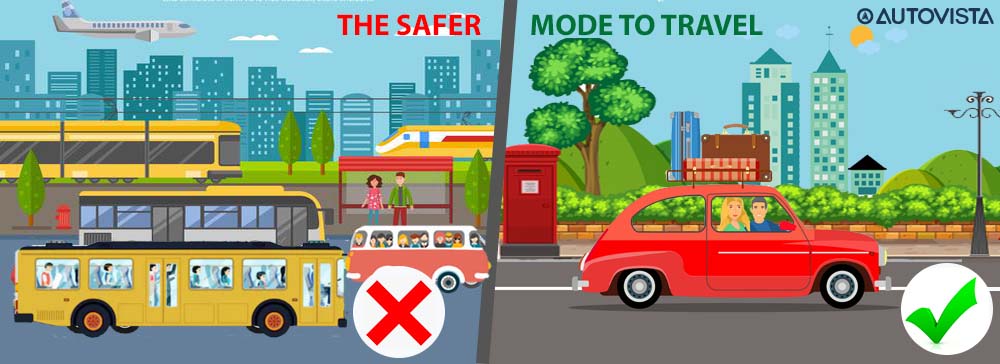
As countries implement measures to return-to-normal activities and get their economies moving again, making vehicles and transportation safe is a major priority. Travelling during COVID-19 can be exceptionally complicated. One has to be careful every second, wearing a face mask, sanitizing one’s hands and keeping safe distances from others. A single moment of carelessness, could create necessary concern regarding one’s health. As normal activities gradually resume, it won’t be always possible for anyone to stop travelling. And at such times, maintaining respectable social distance during one’s travel can become difficult unless one travels by his/her own car!
Driving or walking to work.
Driving alone or walking to your destination can be considered the safest mode of travel during this challenging time.One of the best ways to travel safe in solitary during COVID-19 is to ride alone in a private car, only if the car is sanitized well. Each time you’re sure to deboard the car, make sure to sanitise it well. Also, before boarding the car the next time, don’t forget to disinfect the interiors to avoid contamination.
Community spread of the virus via public transport
Public modes like trains and buses are experiencing a difficult time with regular sanitation, especially during this surge of traffic among passengers to climb on to the vehicles to commute to their workplaces. Travellers ought to utilize liquor based hand sanitizers and wear gloves to keep the spread of infection from surfaces. Some open vehicle specialists are sticking to specific conventions to make travel as sheltered as could reasonably be expected. For instance, a solitary coach of Delhi Metro should permit just 50 travellers, when administrations continue.
However, massed subway cars, trains, and buses can quickly become a seedbed of pollutants due to high foot traffic and riders touching, sneezing, or coughing on shared surfaces. The virus spreads rapidly through community transmission and conductors are bound by their duty to stay close to passengers. During peak hours it is impossible to ignore body contact with passengers. If they come into contact with any affected person, that will soon ensure a fast community transmission.
Also Read: Public Transport Vs private Transport? - Which is safer during the corona pandemicIndia Travel advisory has declared that people should resist using any public transport until the situation subsides. Even if you practice all the coronavirus safeguards, you may be exposed to risk because of the surroundings. You may also come in contact with sick people, which may infect you too. Due to being utilized by a mass population public transport systems are not adequately sanitized and they are unsafe during such an outbreak.
Many people who do not have their own vehicle may be dependent on public conveyance. However, during such challenging times, we should take extra precaution to stay as safe as possible. Therefore, it is absolutely fine if we miss our train or flight to make sure we travel in a secure way.
Why are Private cars the safest mode for travel?
Knowing that social distancing will remain in our lives for a little longer period in the post COVID era, people are keener towards owning a private vehicle to commute in the future. Few are also willing to invest their hard-earned money into pre-owned cars as they have limited budgets. Disinfected private cars will lower the exposure to any mobs and infected places and keep you and your loved ones safe. Travelling or commuting by your own car will help you stay protected from any kind of infections and pollutants.
Preference for digital mode of interaction:
An interest that will possibly soar over the auto dealers and be of good news to all the customers, is that the industry understands that the Indian consumers want to minimize dealer visits and take advantage of convenient online channels. Compared to pre-COVID period, consumers have made a substantial change to digital modes of dealings. In order to comply with consumer sentiments, dealerships like Autovista have started to comply with norms that meet these standards set by the market.
